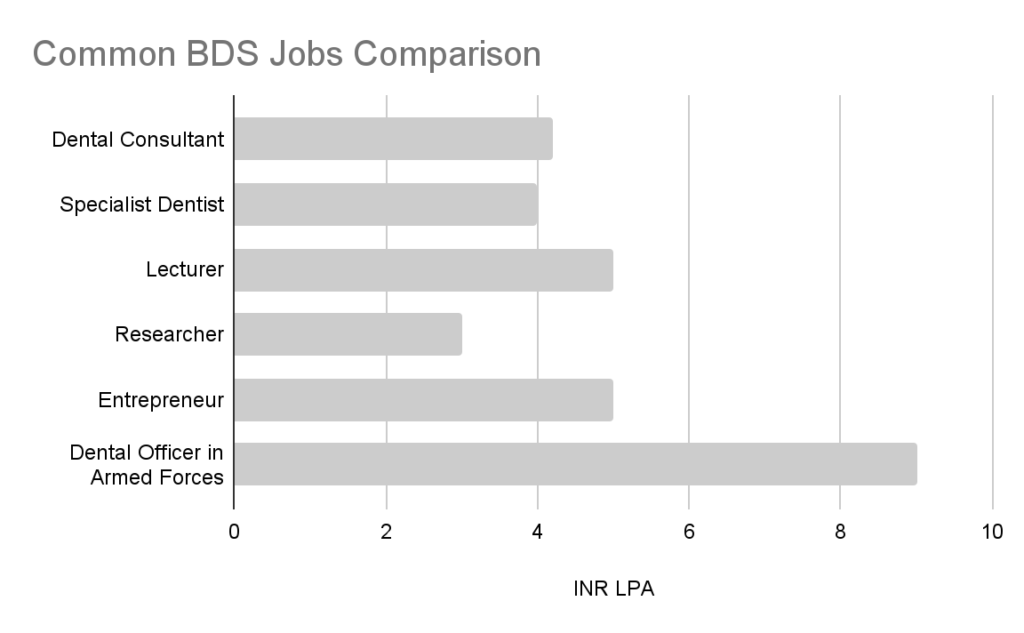If you are interested in pursuing a career in the medical field, you might have considered becoming a dentist. Dentistry is a branch of medicine that deals with the diagnosis, prevention and treatment of diseases and disorders of the oral cavity and its associated structures. Dentists are trained to provide comprehensive oral health care to patients of all ages, from children to the elderly.
But how do you become a dentist in India? What are the benefits of choosing this profession? What are the career prospects after BDS? In this blog, we will answer these questions and more, by giving you an overview of the Bachelor of Dental Surgery (BDS) course, which is the only approved professional dental course in India.
What is BDS?
BDS stands for Bachelor of Dental Surgery, which is a 5-year undergraduate program that helps candidates become dental surgeons. The BDS course duration is 4 years of classroom education and 1 year of mandatory rotating internship. This course is regulated by the Dental Council of India (DCI), which is the apex body for dental education and practice in the country.
The Bachelor of Dental Surgery course covers various aspects of dental sciences and surgeries, such as dental anatomy, dental histology, oral pathology, oral medicine, oral surgery, prosthodontics, orthodontics, periodontics, pedodontics, endodontics, community dentistry, etc. BDS course details also include practical sessions, clinical training, research projects and seminars.
Who Can Apply for BDS?
To meet BDS course eligibility criteria in India, candidates must have passed 10+2 or equivalent examinations with Physics, Chemistry, Biology/Biotechnology and English as compulsory subjects. They must have also secured at least 85% marks in aggregate in these subjects from a recognized board or institution.
Additionally, candidates must have qualified for the National Eligibility cum Entrance Test (NEET), which is the only entrance exam for admission to Bachelor of Dental Surgery courses in India. NEET is conducted by the National Testing Agency (NTA) once a year, usually in May or June. It is a pen-and-paper-based test that consists of 180 multiple-choice questions from Physics, Chemistry and Biology/Biotechnology. The duration of the test is 3 hours and the maximum marks are 720 for BDS admission 2023.
BDS required NEET score and rank, and candidates can apply for counselling and a seat allotment process conducted by various authorities at national, state or institutional levels. The BDS admission process may vary depending on the type and category of colleges (government or private) and seats (all India quota or state quota).
What are the Benefits of Pursuing BDS?
Pursuing BDS offers students rewarding career opportunities in both the public and private sectors. Some of the benefits of doing this course from Terna Dental College are:
More Job Opportunities
A four-year degree in Bachelor of Dental Surgery will provide more opportunities than an associate’s degree or a career diploma. Someone with this degree can choose to work in more areas of dental care, such as hospitals, clinics, schools, colleges, NGOs, defence services, railways, etc. They can also work as lecturers, researchers or consultants in dental colleges or institutions.

Cannot Be Replaced By Technology
Unlike some other professions that are threatened by automation and artificial intelligence, dentistry is a field that requires human skills and expertise. Dental jobs after BDS cannot be taken over by machines or robots, as they need to interact with patients, diagnose their problems, perform surgeries and provide personalized care.
Great Starting Salary
Dentists are among the highest-paid professionals in India and abroad. They can also earn additional income by setting up their own private practice or working part-time, making it one of the most enticing career options after BDS.
Higher Education Opportunities
After completing BDS, candidates can opt for higher education or specialization in dentistry or related fields like a Master of Dental Surgery (MDS) in various specializations such as oral surgery, orthodontics, periodontics, etc. They can also pursue PhD, diploma or certificate courses in dentistry or allied subjects. These qualifications can help them advance their career and get better job positions and salaries.
What are the Career Prospects After BDS?
Graduates have a wide scope of job opportunities after BDS, in both the public and private sectors. They can work as dentists, dental surgeons, dental specialists, dental consultants, dental researchers, dental educators, dental public health specialists, etc. They can also start their own dental clinics or join existing ones.
Some of the sectors where BDS graduates can find employment are:
- Government Hospitals and Clinics: Dentists or dental officers in various government hospitals and clinics across the country are some of the best career options after BDS. Graduates can also join the Indian Defense Services (Army, Navy, Air Force) or the Territorial Army as dental officers. They can also work in the railways, public health departments, municipal corporations, etc.
- Private Hospitals and Clinics: BDS graduates can work as dentists or dental surgeons in various private hospitals and clinics in India and abroad. They can also join corporate hospitals, dental chains, healthcare organizations, etc.
- Dental Colleges and Institutions: Bachelor of Dental Surgery graduates can work as lecturers, professors, researchers or administrators in various dental colleges and institutions in India and abroad. They can also pursue higher studies or research in dentistry or related fields.
- NGOs and Social Organizations: BDS graduates can work as dentists or dental health workers in various NGOs and social organizations that provide oral health care to underprivileged sections of society. They can also participate in various dental camps, awareness programs, outreach activities, etc.
Conclusion
Bachelor of Dental Surgery is a challenging and rewarding career option for those who are passionate about oral health and want to make a difference in people’s lives. It offers a wide scope of opportunities in both public and private sectors, as well as the option to pursue higher education or specialization. However, it also requires hard work, dedication and constant learning to keep up with the latest developments and innovations in the field. If you think you have what it takes to become a dentist, then BDS is the course for you.
FAQs
How many marks are required in NEET for BDS?
While the minimum marks required in NEET to get admission to BDS courses vary from college to college, 450 is generally considered the minimum mark required to get admission in the best dental colleges.
What is the scope of Bachelor of Dental Surgery?
BDS offers great scope, whether in terms of job opportunities and salaries, foreign travel opportunities, the option to study more to earn more, and much more.
Which field in BDS is best?
The best field in BDS depends on an individual’s aptitude and interest and hence is very subjective. Most dentists consider conservative dentistry the best field though, as it focuses on minimising surgical procedures.
How many years is Bachelor of Dental Surgery in India?
The BDS course in India takes a total of 5 years to complete. Out of that, 4 are for classroom and practical study and 1 year is reserved for compulsory rotatory internships.
Which branch is highest paid in dentistry in India?
The highest-paid branch of dentistry in India is pedodontics or pediatric dentistry. Apparently, the national average salary of child health dentists in India is INR 35,0002 per month.
